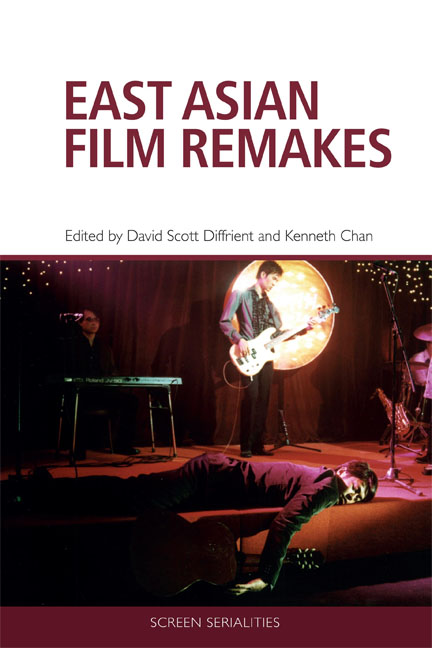Book contents
- Frontmatter
- Contents
- List of Illustrations
- Foreword
- Notes on Contributors
- Introduction: East Asian Film Remakes
- Part I Re-fleshing the Text: Sex, Seduction, Desire
- Part II Serialising Ozu: The Enduring Legacy of a Cinematic ‘Tofu Maker’
- Part III Revisiting Personal/Political Traumas in East Asian Action Films, Gangster Films and Westerns
- Part IV Local Flavours and Transcultural Flows in East Asian Comedies, Dramas and Fantasies
- Index
7 - The Cinema of Serial Vitality: Ozu Yasujirō and Yamada Yoji
Published online by Cambridge University Press: 01 March 2025
- Frontmatter
- Contents
- List of Illustrations
- Foreword
- Notes on Contributors
- Introduction: East Asian Film Remakes
- Part I Re-fleshing the Text: Sex, Seduction, Desire
- Part II Serialising Ozu: The Enduring Legacy of a Cinematic ‘Tofu Maker’
- Part III Revisiting Personal/Political Traumas in East Asian Action Films, Gangster Films and Westerns
- Part IV Local Flavours and Transcultural Flows in East Asian Comedies, Dramas and Fantasies
- Index
Summary
A Japan Times review of Tokyo Family (Tōkyō kazoku, 2013), director Yamada Yōji's remake of Ozu Yasujirō's classic Tokyo Story (Tōkyō monogatari, 1953), expresses a critical sentiment that was perhaps widely felt by audiences when the film was theatrically released: ‘The standard critical compliment for a good remake (and yes, they do exist) is that it makes the audience want to revisit the original. Tokyo Family will have served its purpose if it encourages viewers to check out not only Tokyo Story, but Yamada's other, better films as well’ (Schilling 2013). Upon its domestic and international release, Yamada's film, which hews to the original's basic plot and depiction of the transformations of modernity on the Japanese family, prompted more than a few critics to wonder why a remake of a motion picture that regularly appears on lists of the ‘greatest’ films ever made was necessary at all. According to the author of the aforementioned review, the ‘purpose’ of a film remake is apparently to draw the attention of viewers back to the original film on which it is based (Ibid.). This chapter takes into consideration the ‘standard critical compliment’ of the remake, particularly as a concept that, when deployed in journalistic reviews, typically privileges uniqueness and originality at the expense of reiteration and variation. In doing so, I seek to reconsider Yamada's work and career in general so that his status as an auteur creating films in the spirit of Ozu's cinema can be better appreciated as a vital link to Japan's cinematic past. As we shall see, this ‘spirit’ can be described somewhat specifically, in terms of story and casting, as a way to begin thinking about the serial nature of Yamada's filmmaking practice.
Remaking a Classic
Let me begin by briefly focusing on a series of key formal and narrative features in Tokyo Family so that we might consider how they rework Ozu's film. The stories of both are set mostly in Tokyo in the heat of summer. Both are put into motion by the same initial premise: an elderly couple, Shūkichi and Tomiko Hirayama (played by Ryū Chishū and Higashiyama Chieko, respectively, in the original film, and by Hashizume Isao and Yoshiyuki Kazuko in Yamada's remake), arrives from the countryside in Hiroshima prefecture (Onomichi in the earlier film and Osaki-kamijima Island in the later) to visit their grown children in Tokyo.
- Type
- Chapter
- Information
- East Asian Film Remakes , pp. 140 - 154Publisher: Edinburgh University PressPrint publication year: 2023

